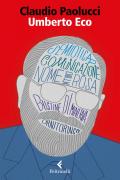Umberto Eco

Umberto Eco has achieved worldwide fame as a novelist, public intellectual, expert in medieval philosophy, semiologist and scholar of literature, art and history. But first of all, he was a great teacher, at university and outside. Claudio Paolucci was one of the last students of Professor Umberto Eco and his collaborator at the University of Bologna. But, first of all, it was a boy who presented himself at Eco's office in 1997 to question some of the ideas included in his book Kant e l'ornitorinco: “That professor, who was incidentally the most famous Italian intellectual in the world, spent hours and hours discussing with a twenty-four-year-old boy with a look that greatly disturbed him".
The pillars of Eco's work have been for decades the love for doubts and the trust in negotiation, the ability to build bridges between different ideas, people and institutions, the irony and the laugh as a test of the existing order, but also the clear vocation to teaching and research. In this book, Paolucci attempts a first reconnaissance of the inheritance (philosophical, public, human and intellectual) of Umberto Eco, showing the close internal relations between his different activities: the semiotic theory and the practice of novelist, the analysis of media and the love for the Middle Ages, the taste for the joke and the seriousness in taking his job as a professor.